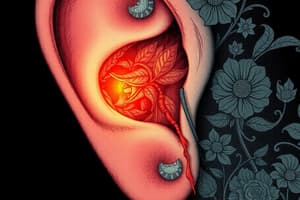Podcast
Questions and Answers
What is the main symptom of 'reverse- or external ear squeeze'?
What is the main symptom of 'reverse- or external ear squeeze'?
- Nasal congestion
- Loss of balance
- Ringing in the ears
- Outward bulging of the tympanic membrane (correct)
At what pressure differential does the eustachian tube become locked and unable to open for equalization?
At what pressure differential does the eustachian tube become locked and unable to open for equalization?
- 10 kPa
- 15 kPa
- 13 kPa (correct)
- 8 kPa
What can occur if a reduced pressure persists in the middle ear due to eustachian tube dysfunction?
What can occur if a reduced pressure persists in the middle ear due to eustachian tube dysfunction?
- Fluid accumulation in the inner ear
- Loss of taste sensation
- Mucosal hyperplasia
- Middle ear bleeding (correct)
Why does the middle ear pressure increase with descent for divers?
Why does the middle ear pressure increase with descent for divers?
What is the characteristic feature of 'the bends' that was originally identified in caisson workers?
What is the characteristic feature of 'the bends' that was originally identified in caisson workers?
What can result from a rapid or significant pressure change in the middle ear?
What can result from a rapid or significant pressure change in the middle ear?
Which part of the body most frequently suffers pathological consequences from barotrauma?
Which part of the body most frequently suffers pathological consequences from barotrauma?
What does barotrauma imply?
What does barotrauma imply?
According to Boyle’s law, what happens to the volume of a gas as the ambient pressure increases?
According to Boyle’s law, what happens to the volume of a gas as the ambient pressure increases?
In diving, at what depth does the greatest change in volume occur according to the pressure and volume relationship?
In diving, at what depth does the greatest change in volume occur according to the pressure and volume relationship?
What gas, making up approximately 80% of inspired air, is absorbed by tissues during diving?
What gas, making up approximately 80% of inspired air, is absorbed by tissues during diving?
What happens if the rate of ascent during diving is too quick?
What happens if the rate of ascent during diving is too quick?
Flashcards are hidden until you start studying



